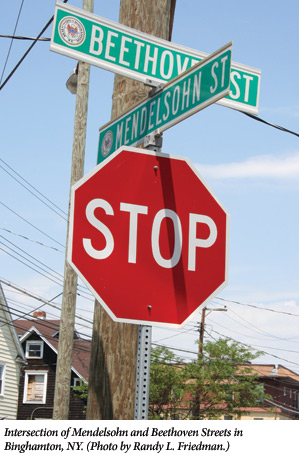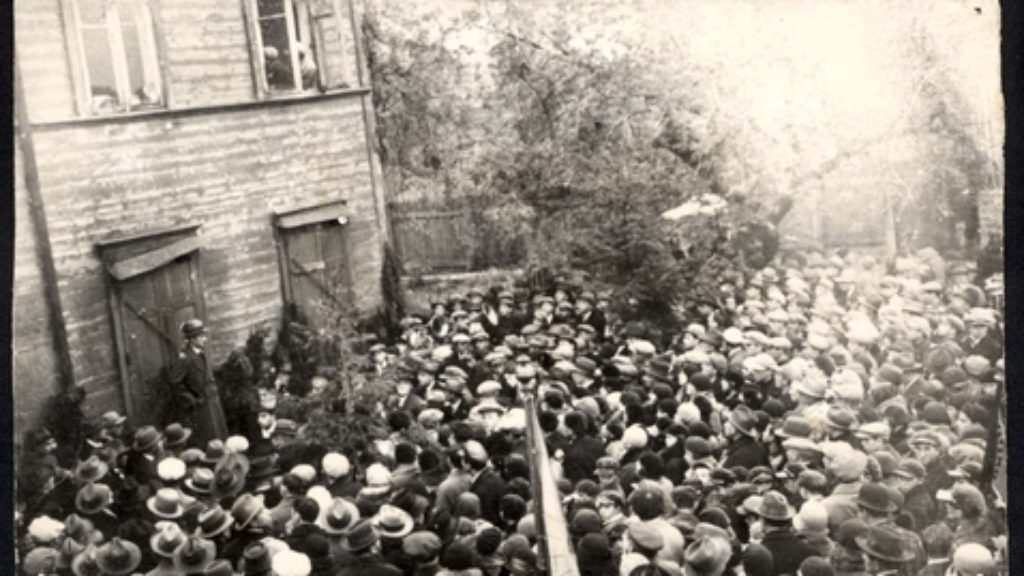Moses Mendelssohn Street
Eliezer Ben Yehuda’s lifelong efforts to refit the classical language of Jewish literature for everyday use helped to create a Hebrew-speaking society in which the memory of his own extraordinary labors would grow dim. Suspecting that the ordinary Israeli in the street could no longer identify the hero of his recent book, Resurrecting Hebrew, Ilan Stavans asked a Tel Aviv shop clerk who Ben Yehuda was.
She was an artificial blonde, wearing an Adidas tracksuit that emphasized her hips and protruding belly. Her initial response was a smile, followed by a silence, behind which I detected hesitation. “Ben Yehuda? It’s a street,” she replied.
“But who is it named after?”
“How should I know? Am I an encyclopedia?”
This did not lead Stavans to any sweeping conclusions, but it did make me wonder. Has Ben Yehuda really been forgotten after only a century? And what about other more or less famous Jews who also have streets named after them in Israel? Sa’adia Gaon or Yehuda Halevi, for instance, or Leon Pinsker, or Menachem Ussishkin? Have Israelis walking down Moses Mendelssohn Street in, say, Jerusalem, forgotten who Moses Mendelssohn was?

I asked myself this because I have spent a lot of time translating and studying the works of this 18th-century German-Jewish philosopher, who was a pioneer of modern Jewish thought as well as one of the first battlers for Jewish emancipation. But I have just learned that it’s not a good question. For, as the historian Michael Brenner has recently observed, “not even the smallest street is named today after Mendelssohn in the capital of the Jewish state.” There is, actually, a tiny Mendelssohn Street on the outskirts of Jerusalem, but it honors the influential architect Erich Mendelssohn. In fact, it bears less of a relationship to the Jewish philosopher than a street in Binghamton, New York, where I have taught for many years. This one is named after Moses’ Christian grandson, the composer Felix Mendelssohn, and intersects with Schubert and Beethoven. It is also missing an “s.”
If there is no such street in Jerusalem today, not even one mangling Moses Mendelssohn’s name, most of the blame can be placed on the shoulders of one person: Peretz Smolenskin. Smolenskin was a Russian-born novelist and journalist who debuted as a Jewish nationalist in the 1870s with a ferocious attack on Mendelssohn as the originator of a craven sort of assimilationism. This charge stuck, as the historian Christian Schulte has shown, prejudicing later generations of Zionists against the philosopher. Smolenskin himself, I should note, has a street in Jerusalem named after him. Just to round out the picture, I should also note that Smolenskin was not only one of Eliezer Ben Yehuda’s inspirations but also one of his targets. Just before he marched off to Palestine, Ben Yehuda chastised Smolenskin for failing to recognize that the resurrection of the Jewish nation could only take place in the Jews’ ancestral land.
Smolenskin, to be sure, was much more unkind to Mendelssohn than Ben Yehuda was to Smolenskin. And it was not only Mendelssohn that Smolenskin raked over the coals. What had triggered his attack in the first place was the great historian Heinrich Graetz’s far too laudatory treatment of Mendelssohn in the eleventh volume of his History of the Jews, for which he upbraided the author. Nothing that Smolenskin went on to say against Graetz, however, could prevent him from having a street named after him in Jerusalem. For no one could plausibly accuse Graetz of having too little Jewish national sentiment. In fact, the German historian Heinrich von Treitschke famously charged him with Jewish chauvinism and too little willingness to assimilate.
Something like these old accusations against Graetz have just resurfaced in a new setting, in a book by an anti-Zionist Israeli writer. In his The Invention of the Jewish People, Shlomo Sand of Tel Aviv University has branded Graetz’s History as the root of much evil, “the first work that strove, with consistency and feeling, to invent the Jewish people.” Sand’s book is a factual mess, but his characterization of the tenor of Graetz’s work is not too far from the truth. Graetz didn’t “invent” the Jewish people, but he did denounce Reform and other Jews’ dilution of the old idea of Jewish peoplehood.
So why did Peretz Smolenskin give Graetz such a hard time? And why did Graetz write such a glowing description of Mendelssohn, a man whose outlook differed so much from his own? And to get to the bottom of the matter, was Mendelssohn really guilty of the things of which Smolenskin accused him?
Smolenskin railed against Graetz even before he began to tear into Mendelssohn. How, he asked, could such a great nationalist historian credit a mediocre, withdrawn, and quickly forgotten philosopher with resuscitating the Jewish people? How could he fail to recognize the degree to which Mendelssohn was responsible for promoting the pernicious idea that the Jews were not a nation at all but merely a religious group? Mendelssohn was not the father of this idea, Smolenskin admitted, but by personal example, he taught it to his children and disciples. He adhered rigorously to Jewish law at a time when he must have seen how necessary it was to distinguish between the essential and the inessential and discard outmoded practices. If he had seen his people for what it really was, “a nation among the nations,” he would have done more to nurse it back to health.
This was not a fair indictment. On the basis of Graetz’s work alone, one could mount a powerful defense against it. Graetz showed how Mendelssohn’s translation of the Bible into German had initiated the “inner liberation” of thousands of young Jews by opening up to them the road to Western culture. He likewise showed how Mendelssohn had furthered their “external liberation” by making the case for their acquisition of full and equal citizenship. Graetz commends him, in fact, for having done so without losing any of his “Jewish-patriotic feeling.”
In an earlier essay entitled “The Structure of Jewish History,” Graetz gave Mendelssohn even more credit for Jewish patriotism. Paraphrasing a passage from Mendelssohn’s Jerusalem, Graetz summarized one aspect of his philosophy of Judaism as follows:
In Judaism, state and religion are rooted in the same soil, or more correctly, they are one. God, the Creator of the world, is likewise the Lawgiver and King of the nation: the civil component is at the same time religious and holy, while the religious is also a civil obligation. Serving the state is serving God.
On the strength of this evidence, he proclaimed Mendelssohn’s conception of Judaism to be far superior to that of the medieval philosopher Sa’adia Gaon because of “its historical, national point of departure.” But he then went on to say that at the end of the 18th-century the Jews were not yet ready for such a thing. What Mendelssohn could do in his own day to advance this national definition of Judaism was quite limited due to the fact that “Judaism had first to recover from the state of exhaustion to which it had been subjected for seventeen hundred years.” Before it could progress any further “it needed to be retaught the Bible.” And it had to regain its self-esteem.
In this early essay, Graetz did not acclaim Moses Mendelssohn for actively steering Judaism toward these two goals, but he did so a quarter of a century later, in his History. However, he did not argue on this occasion that Mendelssohn thereby helped to advance the Jewish nationalist idea. Perhaps he did not wish to upset German-Jewish readers for whom Mendelssohn had become a symbol of their successful integration. If so, this is unfortunate. If Graetz had been more forthright, Smolenskin might not have gone on the warpath, and we might have a Moses Mendelssohn Street in Jerusalem that we could all walk down today.
But does Mendelssohn really deserve such an honor? I certainly don’t begrudge it to him, but I don’t think he does. Graetz’s proto-nationalist Mendelssohn is just not the real one. The very book that he praises and, indeed, the very passages in Jerusalem to which he refers, provide evidence not of an effort to revive the national definition of Judaism but of an attempt to dilute it. Graetz was correct to point out that Mendelssohn’s philosophy of Judaism proceeded from a “national point of departure.” But rather than reaffirm it, Mendelssohn left it behind. In Jerusalem, he strove to uphold the ideas of liberty of conscience and the separation of religion and state. Judaism, he acknowledged, has not known such a separation in the past, but now, after the Jews’ loss of their independence, it has come to terms with it, and is therefore completely in accordance with his own, liberal principles.
Mendelssohn, to be sure, did not, like Reform leaders in Germany a little bit later, explicitly repudiate peoplehood and abandon the hope for the Jews’ restoration to the Land of Israel. But he did reiterate rather vigorously the old rabbinic notion that the Jews were forbidden even to think about returning to their land without direct divine assistance. He reassured suspicious gentiles that the Jews’ messianic hopes in no way interfered with their ability to be good citizens of non-Jewish states. And it is very hard to believe that he truly yearned to see them become anything else. His Jerusalem betrays no trace of a longing to return to the earthly Jerusalem.
Nevertheless, if I were sitting on Jerusalem’s city council and I had to vote on the matter, I wouldn’t be opposed to according special recognition to the man once known as the Socrates of Berlin. If the German capital where he spent most of his life now contains a street named after him, why shouldn’t the very city after which he named his most enduring work on Judaism? Mendelssohn’s role in Jewish history was surely as great or greater than that of any number of Diaspora worthies who have made the grade in the Holy City. And it might even be helpful to have a street in Jerusalem named after a religiously observant opponent of religious coercion. But, given Stavans’ experience with the shop clerk in Tel Aviv, would this really do any good? Perhaps, in the end, Moses Mendelssohn’s reputation will be no worse off if his name is kept off the streets of Jerusalem and confined to books and even, as far as most people are concerned, to the encyclopedia.
Suggested Reading

Remembering the Forgotten
Historian Bernard Wasserstein narrates Jewish life in Europe between the world wars.

Strange Journey: A Response to Shmuel Trigano
Two historians challenge Shmuel Trigano’s analysis of anti-Semitic violence in France.
Letters, Summer 2023
Outside, but Where?; Satmar Literacy; On the Interpretation of Freud, and More
Always Messy: A Rejoinder to Andrew N. Koss
It may be useful as a tool for moral self-improvement to see oneself as adjudicating between opposing forces within one’s breast or brain, though where precisely the adjudicator, or charioteer, resides is more than a moot point.
Comments
You must log in to comment Log In